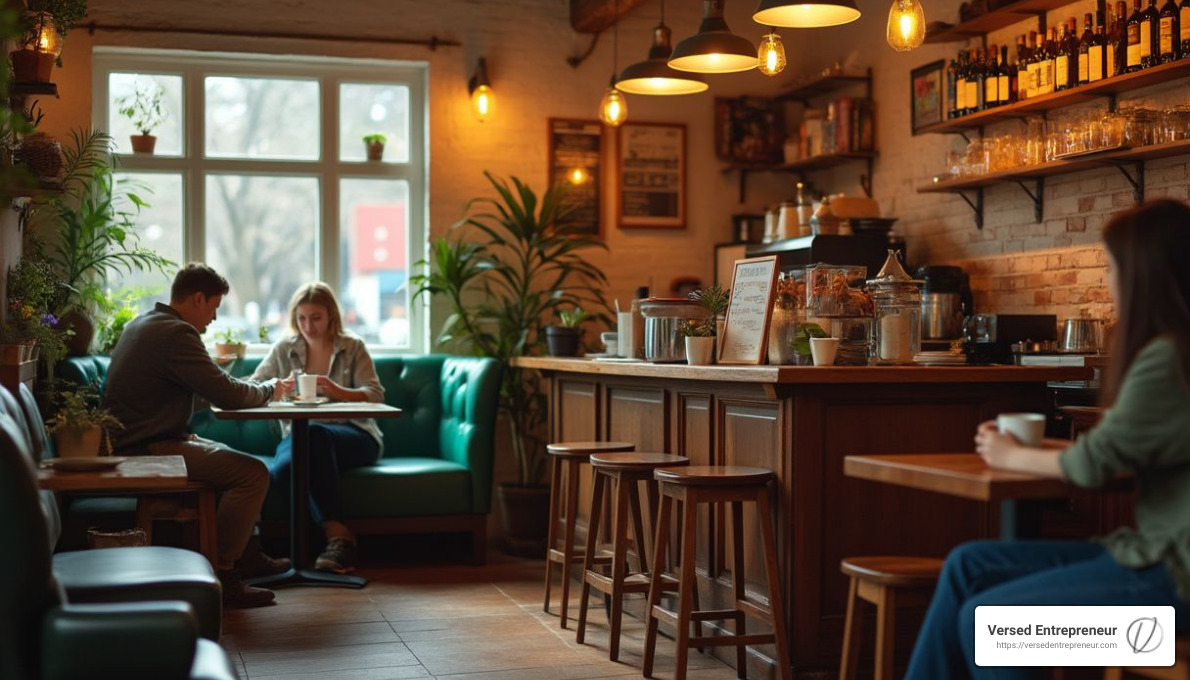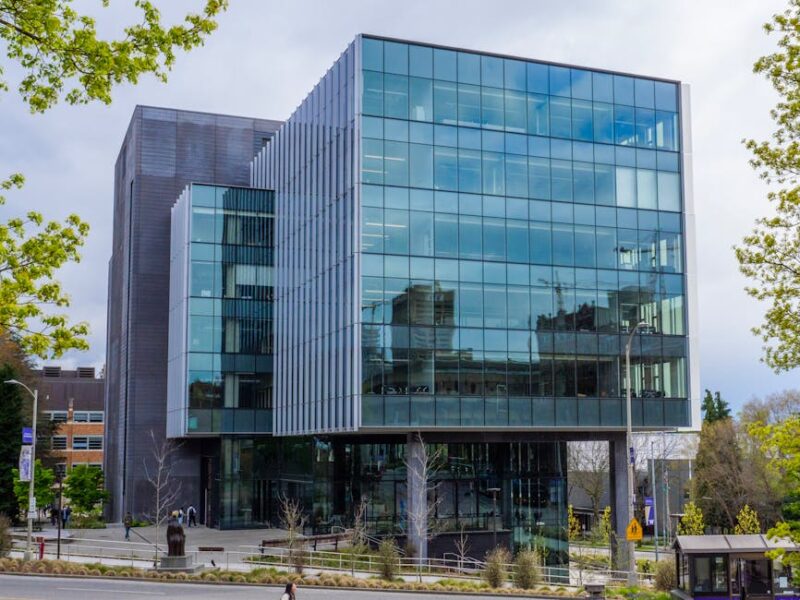Coffee shop startup costs are a pressing concern for anyone eager to step into the thriving world of caffeine and camaraderie. To make things clear from the start, here’s a quick look at some of the essential costs you should plan for:
- Location and Rent: The perfect spot can mean high lease costs, especially in busy areas.
- Equipment: Industrial-grade machines and grinders are investments.
- Training and Staffing: Ensuring quality service requires both time and money.
- Marketing and Branding: Building your brand identity needs a budget for promotion.
- Insurance and Permits: Legal necessities that keep you compliant.
The coffee industry is percolating with opportunities as it undergoes remarkable growth. Coffee shops aren’t just about serving beverages anymore; they’re becoming community hubs where people connect, especially in a world that’s increasingly embracing remote work. Specialty coffee, with its distinct flavors and high-quality brews, is exceedingly popular, with people willing to pay extra for an exceptional experience.
I’m Gabrielle Reese, an entrepreneur with a deep-rooted passion for business and sharing knowledge. My experience in entrepreneurship has given me insights into the financial intricacies of launching coffee shops, particularly in calculating those all-important coffee shop startup costs. Now, let’s explore the details further.
Table of Contents
ToggleUnderstanding Coffee Shop Startup Costs
Starting a coffee shop involves a variety of startup costs. Let’s break down the essential elements:
Location
Choosing the right location is crucial. A prime spot in a busy area can significantly boost foot traffic but often comes with higher rent. According to industry insights, a well-placed coffee shop can attract about 1.5% of passing cars and 5% of pedestrians. For instance, if 10,000 cars and 500 pedestrians pass by daily, you might see 175 visitors. But remember, the more central or popular the location, the higher the lease.
Equipment
Quality equipment is a non-negotiable investment. Your espresso machine and grinders are the backbone of your business. High-quality machines may cost more upfront, but they reduce downtime and ensure better coffee. It’s tempting to cut costs with used equipment, but this can lead to frequent repairs and lost sales. Always prioritize reliability and performance when purchasing your gear.
Training
Training is another critical component. Proper training ensures your staff can deliver excellent service and high-quality coffee consistently. It’s not enough to watch a few online videos. Hands-on training with your equipment is indispensable. Investing in a comprehensive training program can save you time and money in the long run, ensuring your team is equipped to handle the daily demands of a busy coffee shop.
Insurance and Permits
Insurance and permits are necessary to operate legally and safely. You’ll need liability insurance to protect against potential accidents or claims. Additionally, securing the right permits and licenses is crucial. These legal requirements can vary by location, so research what’s needed in your area to avoid any compliance issues.
By understanding these components and planning accordingly, you can set your coffee shop up for success. The next step is to dig into the specific costs associated with each of these areas.
Key Factors Influencing Costs
When planning to open a coffee shop, several key factors will significantly influence your startup costs. Let’s take a closer look at how location, equipment quality, and training can impact your budget.
Location Impact
The location of your coffee shop plays a pivotal role in determining your initial and ongoing expenses. A prime location in a busy area can drive substantial foot traffic, but it often comes with a hefty lease. For example, a coffee shop situated in a high-traffic area might expect visits from 1.5% of passing cars and 5% of pedestrians. While being in a central location can boost sales, it also means higher rent and potentially more competition.
Equipment Quality
Investing in high-quality equipment is essential for the smooth operation of your coffee shop. Your espresso machine and grinders are the workhorses of your business. While it might be tempting to save money by purchasing used equipment, this can lead to frequent repairs and downtime, ultimately costing more in the long run. Reliable, top-of-the-line equipment ensures consistent quality and minimizes interruptions, allowing you to serve your customers without a hitch.
Training Importance
Proper training is crucial for delivering excellent customer service and maintaining high-quality coffee standards. Hands-on training with your equipment is indispensable, as it prepares your staff to manage the demands of a busy shop. Programs that offer comprehensive training on-site can be more economical and effective than short courses or online tutorials. Investing in thorough training not only equips your team with the necessary skills but also helps retain staff by fostering a professional environment.
By carefully considering these factors—location, equipment quality, and training—you can better anticipate the costs and make informed decisions that will set your coffee shop on the path to success.
Up next, we will dig into the specific costs associated with each of these areas, providing a detailed breakdown to guide your planning.
Coffee Shop Startup Costs Breakdown
Starting a coffee shop involves several key expenses, each playing a critical role in your overall budget. Let’s break down these coffee shop startup costs into manageable categories.
Location and Rent
Finding a prime location is one of the most significant costs. A busy area can attract a steady stream of customers, but it often comes with a steep price tag. Lease costs can range from $50,000 to $200,000, depending on the area’s popularity and size. If you’re considering a drive-thru, prepare to add an extra $25,000 to $50,000 for installation.
Equipment and Supplies
High-quality equipment is non-negotiable. An espresso machine alone can cost between $5,000 and $20,000. Grinders range from $500 to $2,500. You’ll also need refrigerators and other essentials, adding another $75,000 to your startup costs. Investing in new, reliable equipment ensures fewer breakdowns and better coffee quality, keeping your shop running smoothly.
Training and Staffing
Hands-on training is vital for excellent customer service. Budget around $1,000 to $2,000 for initial training programs. This investment ensures your staff can efficiently operate equipment and deliver top-notch service, which is crucial for retaining customers.
Marketing and Branding
Your coffee shop’s identity starts with a strong marketing plan. Initial costs for website development, social media advertising, and signage can set you back at least $20,000. A well-crafted brand image helps attract and retain customers, making these upfront costs worthwhile.
Insurance and Permits
Securing your business legally and financially is essential. Liability insurance and property insurance can cost around $3,000 to $4,000 per year. Additionally, permits and licenses add another $1,000 to $3,000 to your startup costs. These ensure you operate within legal guidelines, protecting your business from unforeseen liabilities.
By understanding and planning for these coffee shop startup costs, you can better prepare for the financial journey ahead. In the next section, we’ll explore ways to secure funding for your coffee shop, helping you turn your dream into a reality.
Funding Your Coffee Shop
Starting a coffee shop is an exciting venture, but funding it can be daunting. Luckily, there are several ways to secure the money you need to get started. Let’s explore some popular options: business loans, crowdfunding, and investors.
Business Loans
Business loans are a common way to fund a coffee shop. Banks and credit unions often offer small business loans, which can cover a significant portion of your startup costs. The U.S. Small Business Administration (SBA) also provides loans specifically designed for small businesses, offering favorable terms and lower interest rates. When applying for a loan, having a detailed business plan is crucial. It should outline your projected revenues, startup costs, and break-even analysis to impress lenders.
Crowdfunding
Crowdfunding is another effective way to raise funds. Platforms like Kickstarter and GoFundMe allow you to pitch your coffee shop idea to a large audience. People who believe in your vision can contribute money to help bring it to life. This approach not only raises funds but also builds a community of supporters who are excited about your business. It’s important to create a compelling campaign with clear goals and attractive rewards for backers.
Investors
Attracting investors can also provide the capital you need. Investors can be individuals or groups looking for profitable opportunities. They offer funding in exchange for a share of your business. To appeal to investors, you need a solid business plan and a clear vision for growth. Be prepared to share how you plan to make your coffee shop stand out in a competitive market.
Each funding option has its pros and cons. Business loans offer structured repayment plans but require good credit. Crowdfunding can generate excitement but may not raise all the funds you need. Investors bring expertise but expect a return on their investment.
By exploring these funding avenues, you can find the right mix to turn your coffee shop dream into a reality. Now that you have a grasp on funding, let’s dive into some frequently asked questions about coffee shop startup costs.
Frequently Asked Questions about Coffee Shop Startup Costs
How much money do you need to start a coffee business?
Starting a coffee shop can cost anywhere from $50,000 to over $400,000, depending on various factors like location, size, and type of shop. For example, a simple coffee kiosk might only require $60,000, while a full-sized coffee shop with both seating and a drive-thru could cost up to $400,000. Location plays a big role in these costs. A prime spot in a busy area will likely increase your rent, but it can also attract more customers.
Financial planning is key. You’ll need to account for initial costs like rent, equipment, and supplies, as well as ongoing expenses such as payroll and utilities. It’s wise to have enough cash on hand to cover at least the first six months of operating expenses.
How lucrative is a coffee shop?
The profitability of a coffee shop depends on several factors, including location, customer experience, and efficient operations. On average, coffee shop profit margins range from 10% to 18%. The owner’s salary is often included in the overall payroll expenses, which should ideally be kept to 30% or less of total sales.
Profit margins can vary based on how well you manage costs and attract customers. Specialty coffee shops, which offer unique experiences and premium products, often enjoy higher margins because customers are willing to pay more for quality.
What is the average investment for a coffee shop?
The average investment for a coffee shop varies widely based on the type of establishment you plan to open. A mobile coffee truck might require an investment of $50,000 to $175,000, whereas a sit-down coffee shop could need $80,000 to $330,000.
Investment ranges are influenced by several factors, including equipment quality and the scope of renovations needed. High-end espresso machines and grinders, for instance, can significantly raise your initial costs. It’s crucial to tailor your investment to your business model and local market conditions.
Understanding these cost variations will help you plan better and set realistic financial goals for your coffee shop.
Conclusion
Starting a coffee shop is an exciting venture, but it comes with its fair share of challenges and costs. At Versed Entrepreneur, we understand the intricacies involved in opening a coffee shop and are here to guide you every step of the way. Our comprehensive guides provide valuable insights into coffee shop startup costs, helping you steer everything from location and equipment to marketing and staffing.
One of the most critical aspects of launching a successful coffee shop is developing personalized leadership approaches. This means understanding your market, building a strong team, and creating a unique customer experience. Our resources are designed to help you hone these skills, ensuring your coffee shop not only opens successfully but thrives in the long run.
For more detailed information on starting a business, including coffee shops, visit our Starting a Business page. Here, you’ll find a wealth of resources that can help turn your dream into a reality.
This is not legal advice and reach out to a professional if you have any questions, or research it on the official government website.










